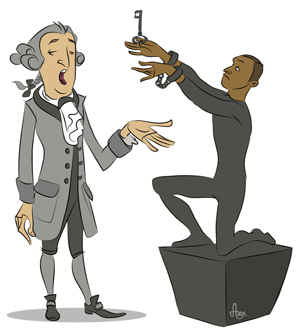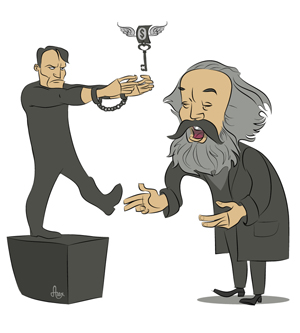
Your complimentary articles
You’ve read one of your four complimentary articles for this month.
You can read four articles free per month. To have complete access to the thousands of philosophy articles on this site, please
Question Marx
A New Twist on Old Ideas
Lucian Lupescu sees how far Kant’s and Marx’s ideals overlap.
In 1784 Immanuel Kant described humanity as being in a state of immaturity, which to Kant is “the inability to use one’s own understanding without the guidance of another” (An Answer to the Question: ‘What is Enlightenment?’, trans Mary C. Smith). The reasons for this immaturity are “laziness and cowardice.” For progress to occur, we must “have courage to use [our] own understanding.” And for Kant, historical progress must yield some form of freedom: “For enlightenment of this kind, all that is needed is freedom. And the freedom in question is the most innocuous form of all – freedom to make public use of one’s reason in all matters.” This freedom must not however be understood as political or social freedom: “A high degree of civil freedom seems advantageous to a people’s intellectual freedom, yet it also sets up insuperable barriers to it. Conversely, a lesser degree of civil freedom gives intellectual freedom enough room to expand to its fullest extent.” Indeed, for Kant, the ordinary people are free to think, but that must be the limit of their freedom: “Argue as much as you like and about whatever you like, but obey!” If people start more than just disputing about society’s ideas, society would collapse in chaos.

Sixty years later Karl Marx told the common people that “the emancipation of society from servitude is expressed in the political form of the emancipation of the workers” (‘Estranged Labor’, 1844, trans Martin Mulligan, 1959). This was the beginning of a new thinking which would give a new twist to Kant’s old ideas. In contrast to Kant’s theory, Marx thought that the current condition of the masses is not caused by their lack of courage to reason, but by the fact that there have always been oppressed classes living more or less at the mercy of higher classes. Marx’s solution is however similar to Kant’s: man (that is, the worker) must be emancipated in order to be free. Laborers must use their reason to unite in a single party that would protect their interests against the bourgeoisie – the Communist Party. Marx explains that “the emancipation of the workers contains universal human emancipation – and it contains this because the whole of human servitude is involved in the relation of the worker to production, and all relations of servitude are but modifications and consequences of this relation.” We can see the worker as a symbol for humanity in general. In his situation, the worker “only feels himself freely active in his animal functions – eating, drinking, procreating… etc.; and in his human functions he no longer feels himself to be anything but an animal. What is animal becomes human and what is human becomes animal.” In other words, men and women should realize that the only way to become truly human is to become empowered by knowledge: knowledge of their condition, and knowledge of how it can be made better. This might not have been made explicit by Marx, but it is implied. After all, how can the workers throw away the shackles of oppression if they are not aware of their condition? And how can they be aware of their condition unless they start thinking for themselves, just as Kant wanted?

Both Kant and Marx envisaged historical progress playing a role in freeing people. Both also thought that this freedom can be achieved by individuals through the use of reason/knowledge. A big difference between them is the way each understood why humans are not currently free. For Kant, it’s each individual’s own fault; whereas to Marx, exterior societal conditions are to blame. Their methods also differ. Kant wants each person to discover thinking for themselves, arriving at some sort of enlightenment of reason, whereas Marx wants the workers to organize in groups and take action against their oppressors. If Kant envisaged a straight course for philosophy through all the frenzy of politic events, Marx thought quite the opposite, wanting philosophy to shake the world by destroying the status quo. For him, the thesis and the antithesis ‘property owners’ and ‘propertyless workers’ must create a synthesis, communism, whereby the workers own the property. This requires a revolution, in thinking, and in politics. For Marx, Kant’s phrase “Argue as much as you like and about whatever you like, but obey!” is an insult. People are in this animalistic condition because they obey. Kant’s ideas are obsolete. Thinking is no longer enough. Action is needed. More than action, a complete change must occur. This old order must be replaced by a new one. The old type of human must make room for the new: the communist. The communist would embody Kant’s basic ideals of Enlightenment, thinking for himself free from the influence of others, but he is more than that: “the Communists… are on the one hand, practically, the most advanced and resolute section of the working-class parties of every country, that section which pushes forward all others; on the other hand… they have over the great mass of the proletariat the advantage of clearly understanding the line of march, the conditions, and the ultimate general results of the proletarian movement” (Communist Manifesto, 1888 Edition, edited by Friedrich Engels).
The progress of the individual and society is a constant preoccupation for both Kant and Marx. They both feel, as we should too, that people need constantly to improve themselves and the society in which they live. Kant and Marx both share a sense of optimism, believing that this is possible. But whether an ideal, perfect human can actually exist in reality, and perform political deeds that would make the world a better place, is a whole different story.
© Lucian Lupescu 2019
Lucian Lupescu is a freelance translator. He can be found at LLTranslator.com, or at ASynonymForRambling.wordpress.com.









